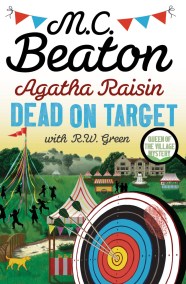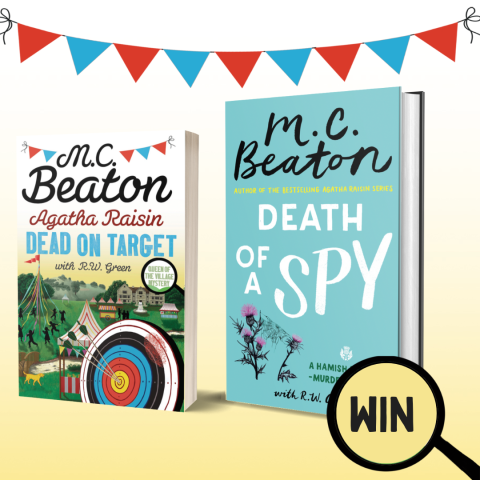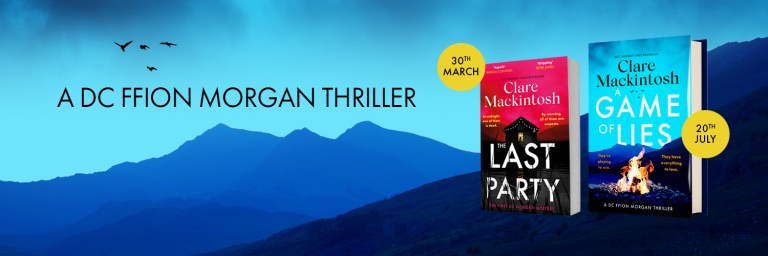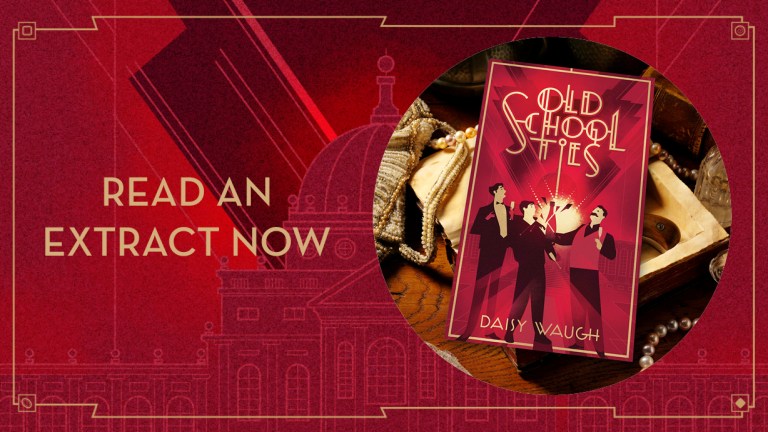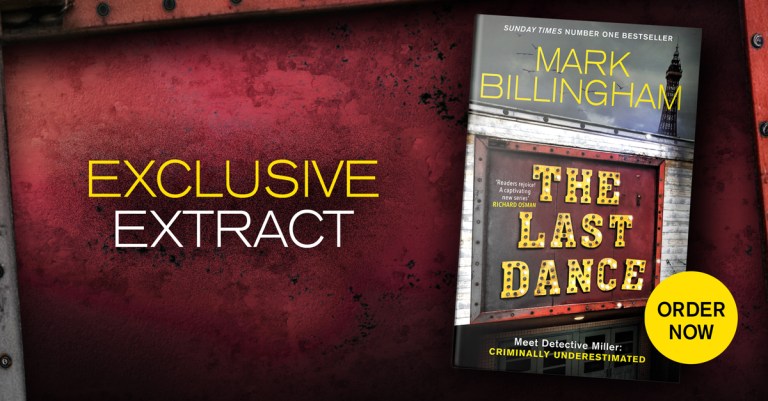Read an Extract from Agatha Raisin: Dead on Target, by M. C. Beaton with R. W. Green
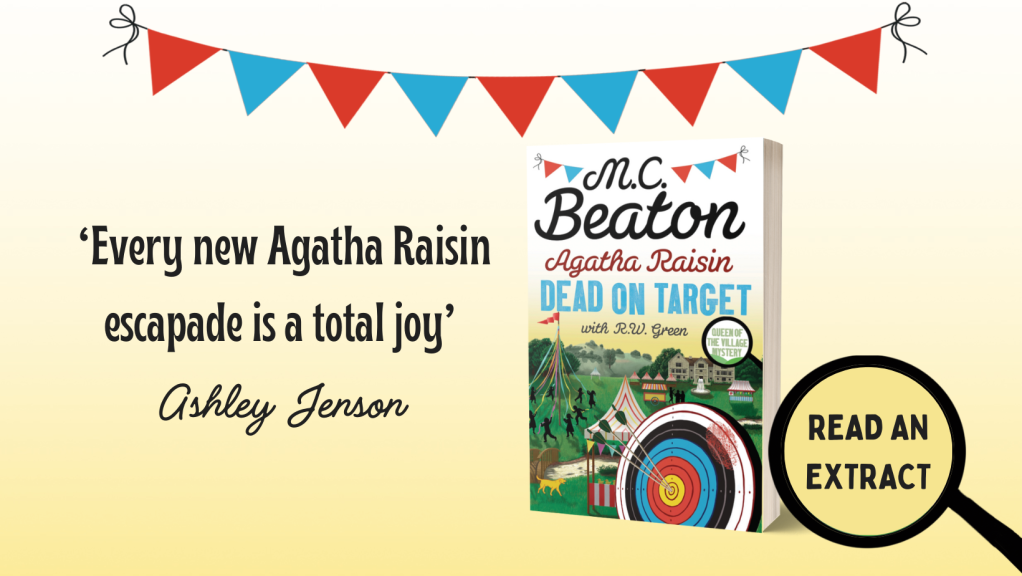
Chapter One
‘I’ll kill him! I swear I will! We can’t let him get away with this!’
The woman was furious, storming past the refreshments tent queue with a man in her wake. He reached out to grab her by the arm and she spun to face him, her long blonde hair a swirling mane.
‘Just wait!’ he pleaded. She was a few years younger than him and for a moment he stood over her, as though he were about to chastise a child, but he quickly relented, attempting to reason with her. ‘It’s not too late to get him to change his mind. I’ll have another word with him . . .’
‘Why bother?’ she snapped. ‘He doesn’t listen to you. He doesn’t give a damn what we think! The time for talking is past. We have to do something! Understand? We have to do something about him!’
‘Listen to me . . .’ The man looked round, suddenly aware that those waiting in the queue had abandoned their own conversations and the half-finished text messages on their phones to be entertained by the unexpected drama. One woman in particular caught his attention.
She had a smooth bob of glossy brown hair and an expression of intense curiosity. He glowered at her. Agatha Raisin stared back at him, her bear-like eyes unflinching.
‘Let’s talk in the car, my love,’ he said as the blonde woman shook her arm free. He urged her towards the nearby car park. ‘Too many eavesdroppers around here.’
‘Such excitement so early in the morning, Mrs Raisin,’ came a voice from behind Agatha, catching her by surprise.
‘I was thinking exactly the same thing, Mrs Bloxby,’ Agatha replied, turning to greet her friend. It amused them to address each other in public with the customary formality of the Carsely Ladies Society, while in private, over a glass of wine or a schooner of sherry, they were Agatha and Margaret. ‘We don’t usually see such theatrics at the Carsely Village Fete until well after the beer tent has opened.’
Agatha nodded towards a marquee where staff from the local Red Lion pub were unpacking glasses, stocking shelves with bottles and exchanging friendly banter with a growing huddle of local men waiting patiently in the sunshine, all eagerly anticipating their first pint of the day.
‘I hope you didn’t take what was being said literally,’ said Mrs Bloxby, smiling. ‘I’m sure Stephanie isn’t about to kill anyone. That’s just something people say when they’re upset.’
‘I know,’ Agatha said, ‘and something was certainly upsetting both of them. I take it you know them?’
‘Yes, Stephanie and Gerald were married here.’ Mrs Bloxby looked to the edge of the field in which they were standing, where the steeple of the Church of St Jude poked its spire above the trees. Agatha had never been a particularly religious person, but she had always found the fourteenth-century church, with its stained-glass windows set in mellow Cotswold stone, a gently comforting presence in the village. It helped, of course, that she knew Margaret Bloxby would generally be waiting with a warm welcome in the rectory next door. Her husband, Alf, was the vicar at St Jude’s.
‘Gerald’s father, Sir Godfrey Pride, owns Carseworth Manor, the big house in the woods over there.’ Mrs Bloxby pointed to the trees beyond the field in which they were standing. ‘His family donated this land to the church for the benefit of the local people. That’s why the fete is now held here each year.’
Agatha gazed out over the colourful collection of tents arranged in neat rows around an open arena in the middle of the field. Jolly, candy-striped canvas structures stood shoulder-to-shoulder with sun-bleached white bell tents and traditional ridge tents while tall teepees and elaborate marquees mingled with family campers and basic garden gazebos. Most had trestle tables set up outside displaying a variety of goods from homemade cakes and home-grown fruit and vegetables to children’s toys, second-hand tools and flowering plants.
Some tables and tents were overwhelmed with myriad articles that some liked to call bric-a-brac but Agatha called crap. Who really wanted to buy mismatched, discoloured crockery, chipped china ornaments, dull crystal decanters or plastic Buddhas? She could well imagine why people would want to rid their homes of such junk, but how on earth could anyone take delight in buying someone else’s junk?
‘We seem to have rather a lot of pre-loved treasures for you to browse this year,’ said Mrs Bloxby, watching Agatha disdainfully appraising the closest of the bric-abrac tables.
Agatha gave her friend a sideways glance, aware that she was sporting a mischievous smile. Margaret Bloxby was petite and neat with plain brown hair laced with occasional wispy strands of silver-grey and a kind face well-practised in forming expressions of sympathy and compassion. The impish smile was reserved for teasing Agatha. Although she would never normally tolerate anyone poking fun at her, the slightest spark of provocation easily igniting her infamously short fuse, Agatha could never be angry with Mrs Bloxby. On so many occasions she had provided Agatha with a warm welcome, a patient ear, a shoulder to cry on and sage advice. She had always been a good friend.
Yet what had always impressed Agatha most about Mrs Bloxby was not her gentle, caring nature, which she greatly respected, but her stalwart fortitude, which she hugely admired. She had a heart of gold and a backbone of steel. Was that, Agatha mused, too much metal in one person? No matter – Mrs Bloxby’s unflinching courage had saved her more than once. She remembered the time when she had been punched by a man whom Mrs Bloxby had immediately smacked over the head with a jar of homemade chutney. Then there was the gunman who would surely have killed them both had Mrs Bloxby not wrestled the weapon from him and shot him in the chest. He had survived, but Agatha
often wondered how Margaret Bloxby would have fared had he not. She had been distraught at the thought of having almost taken another’s life. Perhaps sometimes there was an overwhelmingly discordant clash of gold and steel.
‘You know how much I hate all that stuff.’ Agatha laughed, waving a hand at the bric-a-brac, dismissing the junk along with the disturbing memories. ‘Still, I suppose all of this goes towards helping good causes.’
‘It does indeed,’ Mrs Bloxby agreed. ‘One of them this year is the restoration of our old graveyard.’
‘I hope you’re not going to set all the old gravestones straight. They wouldn’t look right in tidy rows. They should stay as they are, all higgledy-piggledy, like a bunch of best pals growing old together, not soldiers on parade.’
‘I agree. The restoration work’s all about rebuilding the graveyard wall and the paths. Besides, some of the stones are so fragile that they’d fall apart if anyone tried to move them.’
Having reached the front of the queue, Agatha insisted on paying for their coffees and was handing one of the recyclable paper cups to Mrs Bloxby when she heard a jingle like sleigh bells. A middle-aged man walked past wearing a tall black hat, a red neckerchief and a white shirt with white trousers. His hat was decorated with a garland of flowers while red sashes fastened with rosettes criss-crossed his chest. The jingling bells were clustered on straps tied just below his knees.
‘Ah, the morris men.’ Mrs Bloxby gave the man a cheery ‘Good morning!’ and a generous smile. ‘I’ve always loved the morris men, haven’t you? We should really call them morris dancers now, of course – they’re no longer men-only groups.’
Agatha spotted the rest of the dancers in the distance, all similarly attired, approaching from the car park. She squinted at one of the figures. There was something familiar about the way he moved, the way he held his shoulders. It couldn’t be, could it?
‘Quickly!’ she breathed, holding her coffee cup out to Mrs Bloxby. ‘Take this!’
In what appeared to be one swift movement, she produced a compact mirror from her handbag, smoothed her hair, checked her lipstick and straightened her dress.
She felt a wave of relief that she had chosen that particular dress. The white flower pattern on a black background wasn’t too frivolously summery and the skirt reached well below the knee, but the neckline still dropped low enough to provide a certain . . . allure. A white rope belt cinched it neatly at the waist. An instant later, the compact was back in her handbag and she was retrieving her coffee.
‘Slick.’ Margaret Bloxby nodded her approval. ‘What was that in aid of?’
‘John!’ Agatha called to one of the approaching morris dancers, waving madly.
A tall, well-built man looked towards her and grinned.
He removed his hat and pretended to hide behind it as he drew nearer, feigning embarrassment at having been exposed as a morris dancer.
‘You never told me you were involved in this!’ Agatha chided, wagging her finger in mock rebuke.
‘I can explain!’ He laughed, stooping to kiss her cheek.
‘One of the lads was injured and they asked me to stand in. I might be a bit rusty – I haven’t done this for years.’
‘Mrs Bloxby,’ Agatha said, sweeping a hand towards her in introduction, ‘this is my friend John Glass.’
Mrs Bloxby watched Agatha and John exchange a glance and caught a twinkle in Agatha’s dark eyes.
‘Pleased to meet you, Mr Glass,’ she said, shaking John’s hand. ‘I’m so looking forward to seeing the morris . . .’
She was interrupted by a rapid popping noise followed by a dull boom from the PA system’s loudspeakers.
‘Good morning, everyone . . .’ came a man’s voice.
Pop! Boom!
‘. . . is this thing working . . .?’
Pop-pop! Boom!
‘Well . . . welcome to the Carsely Village . . .’
Pop! Boom! Pop!
‘Oh, dear,’ sighed Mrs Bloxby. ‘Alf’s making the announcements. He’s quite at home delivering one of his Sunday sermons from the pulpit, but this is well outside his comfort zone.’
The Reverend Bloxby, dressed in a short-sleeved black shirt and black trousers that made him look even smaller and thinner than ever, struggled on, gripping his microphone with knuckles as white as his dog collar. Agatha could see his lips moving as he stood in front of the administration tent, reading from a sheet of paper, but now no sound was coming from the speakers at all. She was surprised at how flustered he seemed. Normally he came across as quite confident and self-assured, almost arrogant. Suddenly his voice came blasting out.
‘. . . so we’ll have everything from archery and morris dancing to shin kicking and dwile flonking . . . wait . . . what? That can’t be right . . .’
The PA system let out a banshee screech.
‘Oh, bloody hell!’ wailed the reverend.
‘I think I’d better go lend a hand,’ said Mrs Bloxby, handing Agatha her coffee and hurrying over to her husband.
‘Fancy a coffee?’ Agatha asked, offering John Mrs Bloxby’s cup. ‘Margaret didn’t touch it and it’ll be cold by the time she gets back.’
‘Thanks,’ John said. ‘I wasn’t sure if you’d be here today.’
‘Nor I you,’ Agatha replied. ‘I thought you were working.’
‘I managed to swap to a late shift in order to help out the lads.’
‘Is that a privilege of rank in the police force, Inspector Glass?’
‘Not really. You usually need a bit of luck on your side to swing it.’
‘I see – so how did you become a morris dancer?’
‘Quite by chance, really. Years ago, a couple of friends met a bunch of morris men in the pub and they persuaded us to give it a go. I gave it up when work started taking over.’
‘So who was it that was injured? What happened to him?’
‘So many questions!’ He laughed. ‘If I didn’t know you were a private detective, I could probably have guessed.
My old pal Wayne mistimed a move, slipped and got one of these in the face.’
John held up a stout, smooth stick.
‘I take it you don’t normally whack each other with batons?’
‘Some of the dances involve clashing sticks together. They say ash or hazel make the best sound. It’s all part of the fun.’
‘Speaking of fun, when are you going to take me out dancing again?’
‘I checked with Strangley’s. They’re having another ballroom night in two weeks. I’ve already booked.’
Agatha had first met John when they danced together at the wedding of their mutual friends, Alice and Bill Wong, also both police officers. It was the first time in years that she could remember having danced the night away in the arms of a man who neither stood on her toes nor tripped over his own feet. She regarded herself as an accomplished dancer but John, whom she learned had danced competitively when he was a youngster, was impressively elegant and graceful.
Less than a week ago, John had surprised her with dinner at Strangley’s, a spa hotel between Mircester and Chipping Camden. Agatha had previously only ever thought of the hotel as the sort of place for hen parties and golfing weekends, neither of which held much interest for her, but John had discovered their special dinner-dance events. The evening had spun on late into the night and she had woken the next morning in her cottage bedroom, lying in John’s arms.
‘You’re an angel,’ she said, craning her neck to kiss him on the cheek, and he slipped his arm around her shoulder.
‘Steady, tiger,’ she added, removing his arm.
‘Remember . . .’
‘I know . . .’ he said, with a resigned sigh, fully aware that Agatha regarded too many displays of public affection as being undignified, slightly vulgar and really only for teenagers, ‘. . . there’s a time and a place for everything.’
‘Speaking of which,’ Agatha said, ‘why do we have morris dancers here today? We’re well into autumn and I thought it was something that happened in the spring. Isn’t it all to do with fertility rites and suchlike?’
‘Not entirely. Cotswold dances traditionally tended to focus on Whitsun, which is at the beginning of summer, but morris dancers have always been out and about on Boxing Day, at New Year – pretty much any time, really. The dances have been performed for centuries. Working men, farm labourers, builders and all sorts got involved because they were paid in cash, food and ale. Nowadays we do it for charity – and the ale!’
‘So what was all that about shin kicking and . . . vile thonking?’
‘Dwile flonking,’ John corrected her and she raised a suspicious eyebrow, half convinced that he was about to try to hoodwink her with some dubious shaggy-dog story.
‘They’re both real things, honestly.’ He grinned. ‘Shin kicking’s been part of the Cotswold Olimpicks since . . .’
‘The Cotswold Olimpicks?’ Agatha folded her arms, her head cocked slightly to the right, challenging John to prove that he wasn’t simply pulling her leg.
‘I kid you not,’ John defended himself, smiling. ‘The Cotswold Olimpicks are held every year just outside Chipping Camden around the spring bank holiday. The games were first staged in the seventeenth century, long before the modern Olympic Games. There have always been lots of traditional contests – tug-of-war, running races and suchlike – but shin kicking has been part of the games since they began. It’s a kind of wrestling. Two competitors face each other, grab each other by the collar and take swipes at each other’s shins. You have to try to force your opponent to the ground or get him to surrender.’
‘And dwile flonking? Is that also an Olimpick sport?’
‘It is nowadays. It involves a group holding hands and dancing round in a circle. The person in the middle of the circle is the flonker and has to dip a stick like this . . .’ he held up his morris dancing stave, ‘. . . into a bucket of ale.
The flonker then fishes out a cloth soaked in ale, the dwile, and flings, or flonks, it at the dancers. A dancer who’s hit has to drink from the bucket and . . .’
‘Don’t tell me.’ Agatha shook her head with a resigned smile. ‘The flonker drinks the ale if no one is hit. It’s a drinking game, isn’t it? How do you know who’s won?’
‘No one can ever remember.’
‘I take great pride in being able to tell when men are lying to me,’ Agatha said, laughing, ‘and that’s all too ridiculous not to be true.’
‘No shin kicking or dwile flonking for me, though,’ John said with, Agatha thought, a hint of regret. ‘I’m on that late shift tonight and I don’t want any injuries before our next ballroom date!’ He struck a dance pose, as though holding an invisible partner in his arms, and waltzed off towards the other morris dancers, explaining that he had to ‘go through some of the dances with the lads’, then he turned, pausing for a second to blow her a kiss.
Agatha watched him join the huddle of white-clad dancers. John seemed very relaxed – far more so than when they had first met. He had always been charming and good company but as they had come to know each other better, she had started to see a man far younger than his fifty-four years begin to emerge. That, she told herself, never one to dim the sparkle of her own personality beneath a cloak of modesty, is entirely down to me – Agatha Raisin. I have made a difference to that man’s life.
He . . .
‘He really rather likes you, doesn’t he?’ The cultured drawl of Sir Charles Fraith came from over Agatha’s left shoulder. She turned to face him.
‘I wish people would stop sneaking up on me!’ she snapped, suddenly furious at having her thoughts interrupted, especially since Charles seemed somehow to be reading her mind. ‘You’re the second one today. What happened to a simple “Hello” or “Good morning” to attract someone’s attention rather than just blundering up and disturbing them?’
‘Sorry, Aggie, I . . .’
‘And don’t call me that!’ Agatha had tolerated the pet name when she and Charles had been close, when they had been lovers, but saw no reason to do so now that they were, at best, uneasy friends.
‘Agatha . . .’ Charles took a deep breath and a smile etched lines in his perfectly shaved face, the tiniest of wrinkles appearing at the corners of his eyes. There were no such creases on his crisply pressed shirt, his blue sports jacket or his cream trousers. Sir Charles Fraith was, as always, immaculately turned out, with scarcely a lock of his fine, fair hair ever out of place. Even when he was stark naked, Agatha knew from past experience that he was an utterly crumple-free zone. ‘Good morning. I apologise for catching you off guard.’
‘Feisty little filly, ain’t she, Fraith?’ said an older man accompanying Charles.
‘Feisty little . . .?’ Agatha glowered at the man. He was far older than Charles, old enough to be his father, and taller, although most men were, with a voice that had the same upper-class tone. His was tinged with an added croak where decades of cigarettes and whisky had dulled its refinement. ‘Who the hell are you?’
‘Agatha, this is Sir Godfrey Pride,’ Charles explained.
‘We are what you might call neighbours.’
‘No,’ Agatha said firmly, ‘you are not what I might call neighbours. It would take a day to walk from where you live at Barfield House to where he lives. Your house is surrounded by over a thousand acres, Charles, so you’re never going to have a cup of tea and a chat over the garden fence like what I might call neighbours.’
Neither did they seem the likeliest of chums. Sir Godfrey had a shock of wild grey hair, a ruddy face and bleary eyes peering out from behind dark, shaggy eyebrows. His tweed jacket was scuffed and threadbare at the cuffs and his voluminous, rumpled corduroy trousers had badly worn areas that were faded pink, yet were alarmingly red elsewhere, a bit like the boozy face of the old man himself. He reached out, offering Agatha his hand. She made no move to shake it.
‘I am not a filly,’ she said coldly. ‘I am a businesswoman.’
‘Meant nothing untoward by it, my dear,’ he said, by way of apology, ‘and it’s your business skills that I’m interested in. I hear you’re very good at what you do.’
‘The best,’ Agatha confirmed, finally accepting his handshake.
‘I understand that this field is part of your land.’
‘It was once,’ he said, nodding, ‘but everything changes. Only old dinosaurs like me, set in our ways, remain the same. Pride’s the name, don’t y’know, and pride is the enemy of progress.’
‘Sir Godfrey has a problem he’d like to discuss with you,’ said Charles.
‘Yes, but I won’t trouble you with that now,’ Sir Godfrey said, smiling softly at Agatha. ‘You should enjoy the fete and this lovely weather. The dark days of winter will be upon us soon enough.’
‘If there’s something I can help you with, then we should arrange to meet,’ Agatha said, handing him her
business card. ‘You can reach me on this number on Monday morning.’
‘Thank you, my dear. I shall look forward to talking to you again then. In the meantime, I can see something that needs my urgent attention.’ He was looking towards the Red Lion tent, now open for business. ‘Care to join me, young Fraith?’
‘It’s a tad early for me, old chap,’ said Charles, ‘but I may catch up with you again later.’
Sir Godfrey stuffed his hands in his jacket pockets and bumbled off towards the beer tent.
‘What was that all about?’ asked Agatha once the old man was out of earshot.
‘No idea,’ Charles said, shrugging. ‘I bumped into him on the way here. Haven’t seen the old devil in years, but he asked me to introduce him to you. He needs help with something but doesn’t know who to trust. Said he wanted to see if you were the right sort.’
‘The right sort?’ Agatha felt a wave of exasperation turning to another rising tide of anger. ‘Honestly, you people never cease to amaze me. Do you mean the “hunting, shooting and fishing” sort, or the “loyal, obedient servant” sort?’
‘His words, not mine,’ Charles said, defensively. ‘All I think he meant was that he was looking for someone trustworthy.’
‘And did I pass the test?’ Agatha folded her arms, a look of defiance on her face. ‘I should say so!’ Charles laughed. ‘You stood your
ground, demanded respect. You couldn’t have been too upset by him, though. You still gave him your card.’
‘Business is business,’ Agatha said, letting her arms drop and the tension drain from her shoulders. ‘How are things going with your new enterprises?’
‘Rather well, actually. The new vineyard looks fantastic and the winery is under construction. By this time next year we will be producing our first wine. It’s all damned expensive, though. A lot of investment.’
‘I thought you’d found business partners to help with that?’
‘I’ve had lots of interest, but most of them want to see things up and running before they commit.’
‘Oh, Charles,’ Agatha sighed. ‘You haven’t staked everything on this business, have you?’
Agatha recalled the lean years prior to Charles inheriting a fortune from the family of his deceased wife following their short marriage. He had been what is often referred to as ‘land rich but cash poor’, after a series of increasingly desperate, utterly disastrous investment schemes.
‘Not at all,’ Charles assured her, with what Agatha saw as forced nonchalance. ‘I’ve had to spend a bit on essential maintenance around the estate, too, but there’s still plenty left in the pot . . . enough to take you out to dinner perhaps?’
‘Charles, I . . .’ She glanced over to where John was in animated discussion with the other dancers.
‘Ah, yes.’ Charles nodded. ‘Your morris man. I noticed the way you were looking at him.’
‘I like him a lot. He’s a good friend.’
‘We were good friends once. Practically inseparable. I miss that . . .’
‘A lot of water has flowed under the bridge since then, Charles. There’s no going back. That will never happen.’
‘Never say never.’ He smiled. ‘Who knows what the future holds, after all? How is James?’
‘I haven’t seen or spoken to him in quite a while,’ Agatha said. Her last conversation with James Lacey, her ex-husband and next-door neighbour, had been a short, high-volume exchange that had ended with the slamming of their respective front doors. ‘I think he must be off on his travels again, writing articles about Bolivia, or Outer Mongolia, or somewhere.’
‘Really? I heard that . . .’ Charles paused, running a hand through his hair, a sure sign, Agatha knew, that he felt he was on shaky ground.
‘You heard what?’ she prompted him. ‘Come on, Charles, spit it out.’
‘No, it’s nothing,’ he said, quickly. Then, realising that he had his catch on the line, he decided to reel her in. ‘Idle gossip, I’d say. Let me find out if there’s any truth in it and I can tell you all about it over dinner . . . Monday evening?’
‘Dinner,’ Agatha said, fully aware that she was being played but peeved that Charles might have heard something about James that she had not. What was it? Another woman? Was he moving out of Carsely? She shook her head, trying to persuade herself that she couldn’t care less, but she had to know. ‘Dinner only. Call me.’
She marched off, leaving Charles in no doubt that the conversation was over by taking a sudden and avid interest in the nearest bric-a-brac stall.
The events at the fete were soon in full swing and Agatha enjoyed watching the first of the morris dances, which involved energetic hopping and handkerchief waving in time with music provided by an enthusiastic fiddle player and a tiny, white-bearded old man who was almost hidden behind a giant accordion. Despite his misgivings, John never put a foot wrong, as far as Agatha could tell.
There followed an archery demonstration by the Ancombe Archers Club. Six archers – three men and three women – using modern, high-tech bows stood at shooting positions near the middle of the arena, aiming at targets around fifty metres away. There were no spectators anywhere near the targets, and the area behind the targets was a tangle of shrubs and bushes that marked the edge of some woodland. The circular targets had a white outer ring, with a black ring inside it, then a smaller blue ring, a red ring and a gold centre circle.
They staged the demonstration as a competition, each archer firing six arrows and the one with the lowest score dropping out until there was just one winner, one of the women. Agatha applauded each stage of the contest along with the rest of the spectators. She was impressed that not one arrow missed the target and amazed at how many of them struck gold. The Ancombe Archers were deadly accurate.
When the archery was finished, Mrs Bloxby could be heard once more on the PA system announcing that anyone interested in archery should join the archers down by the targets for a brief lecture, while the top end of the arena would now host the dog show.
‘There will be awards,’ she informed everyone, ‘for the cutest puppy, the most beautiful female, the most handsome male, and the dog who looks most like its owner.
Last year that one was won by Stan the bulldog and his owner, also called Stan. Stan’s wife told me that Stan didn’t snore as loudly as Stan, but Stan definitely drooled more than Stan – and I never worked out which Stan was the snorer and which was the drooler . . .’
Agatha had never considered herself a ‘pet person’ until she had been given her two cats, Boswell and Hodge. At first, she had been wary of looking after the animals, but once she realised how independent they could be, which took some of the worry out of having them in the house, and how affectionate they were, which had both surprised and delighted her, she had come to adore them. Dogs, on the other hand, were too much of a burden. She found herself smiling, however, when she saw the gaggle of puppies on leads being walked into the arena. Some trotted along, tails wagging, some bounced around, and some leaped on others, rolling and wrestling in a tangle of leads. Any reprimands from their owners were met with lolling tongues, wide, bright eyes and more tail wagging. They’re cute, Agatha admitted to herself, but the archers are really impressive. Those bows could kill – an almost silent murder weapon– and that makes them far more interesting than a bunch
of smelly little puppies!
Agatha strolled over to where a small crowd had gathered around the group of archers. Barriers had been put
in place and the spectators were encouraged to stand behind them as two of the archers, one male and one female, set up a target about ten metres from where a bearded man with a cloud of snowy white hair stood holding his bow. Agatha guessed he was in his late seventies, but he stood tall and straight and, once those setting up the target were well clear, he selected an arrow, drew back his bowstring and shot the arrow straight into the centre of the gold circle.
‘Good morning, everyone!’ the old man said, lowering his bow and turning to the spectators. ‘My name’s Robin Hood . . .’ A ripple of polite laughter flowed from the crowd.
‘That always gets a bit of a laugh,’ the man continued, grinning, ‘but my name really is Robin Hood. You’re probably all now thinking, “Poor sod – how could his parents do that to him?” Well, Hood’s my father’s family name and his first date with my mum was a trip to see the old nineteen thirty-eight Robin Hood movie, so I’ve always been quite grateful they didn’t call me Errol Flynn Hood! In fact, if they’d met a couple of years later, I could have been Pinocchio!’
There was more laughter from the crowd and Agatha smiled. Public speaking was something she’d had to do many times in the past when she had run her own London public relations agency. She had given speeches to gatherings of sophisticated, highly influential businesspeople
and had always prepared rigorously beforehand in order to conquer her nervousness. She’d been spurred on by a horrendous recurring dream where she was addressing an audience only to hear her voice slowly revert from the acceptably cultured accent she had worked so hard to perfect to the Birmingham twang that betrayed her roots in a council tower block. Mr Robin Hood, on the other hand, had a natural, relaxed manner that easily charmed his audience.
‘So, with a name like Robin Hood, what other sport could I possibly take up than archery?’ Robin Hood laughed. ‘Now, who would like to give it a go? How about you, young lady?’
It took Agatha an instant to realise that he was looking at her.
‘Come along, don’t be shy – give her a round of applause, everyone. What’s your name, young lady?’
With the eyes of the crowd now upon her and the applause ringing in her ears, Agatha gave Robin her name, taking a tentative step forward to be met by one of the female archers who asked if she was right- or lefthanded.
On being informed that she was right-handed, she asked for Agatha’s left arm and, once Agatha had set her handbag on the ground at her feet, she helped her to strap a leather protector over her inside forearm.
‘My Maid Marion will help you with the kit,’ said Robin, standing close to the spectators, a few metres to Agatha’s right. ‘Actually, her name’s Petula but none of Robin Hood’s rogues were ever called Petula, were they?’
The woman laughed. She was the winner of the archery contest, slender, dark-haired, and Agatha judged her to be in her early forties. She helped Agatha fit a kind of three-fingered glove on her right hand.
‘The arm protection stops the bowstring from doing any damage when it’s released, Agatha,’ Robin explained, addressing the spectators as much as he was Agatha, ‘and the finger guards do likewise when you draw back and release. Spider will now show you the bow. He’s called
Spider because of that spider’s web tattoo on his left elbow. For goodness’ sake nobody ask him where the spider is – he might show you!’
Spider was a skinny, scruffy individual in his late twenties and only a little taller than Agatha. He showed her how to fit the bow’s hand grip in the ‘V’ between the thumb and forefinger of her left hand.
‘The grip allows you to balance the bow there without clutching it too tightly,’ Robin explained. ‘Then, standing sideways with your shoulders aligned with the target, you can raise your hand to shoulder level, keeping your arm straight.’
Robin demonstrated raising the bow and Spider, standing much closer behind Agatha than she would have liked, gently lifted her wrist until her hand was at shoulder height. As Robin outlined the importance of adopting a ‘square stance’ with your feet parallel to the target, Spider released Agatha’s wrist. His fingers traced a path up her arm, drifting gently down to linger lightly around the side of her left breast. Agatha froze. She could scarcely believe it. Had she really just been secretly groped in front of a crowd of people? She turned her head to glower at him only to see a sly leer on his face.
‘Keep your distance and keep your hands to yourself, Spider!’ she hissed. ‘Or I’ll crush you like a bug!’
Undaunted, he remained standing close behind her. Robin was now demonstrating, without actually drawing the bowstring, how the thumb on the right hand should come back to a point just below the jaw.
‘You need to keep your body straight,’ he said, ‘so that your arms are level across your shoulders, forming a “T” shape with your torso . . .’
‘Like this?’ Agatha asked, bringing her elbow up and flinging it back. She caught Spider just below the nose.
He yelped and doubled over, cupping his hands over his face. Some of the spectators winced, others simply burst out laughing.
‘Whoops!’ Robin called. ‘Gently does it, Agatha. You’d best take a step back there, Spider!’
Spider retreated, rummaging in the pocket of his jeans to retrieve a crumpled tissue and stem a faint trickle of blood from his nose.
‘Maid Marion, would you take over with Agatha, and give her an arrow, please?’ Robin motioned Petula forward.
‘He deserved that,’ Petula said quietly, lending Agatha a hand to fit the groove or ‘nock’ at the base of the arrow to the bowstring. ‘He’s such a creep. Somebody needs to teach him a lesson.’
Agatha looked Petula in the eye, the younger woman returning her gaze from beneath a furrowed brow. With that brief exchange, a moment of dark understanding passed between them. Petula had also suffered from Spider’s unwelcome attention. Petula stepped back,
Robin calling out instructions.
‘Keep the arrow pointing down the range at the target, Agatha,’ he called. ‘Now, with your index finger above the nock point, your middle finger and ring finger below, raise the bow. Keep that left arm straight and bend your right arm to draw back the bowstring, thumb below your jaw.’
Agatha did as instructed, looking down her left arm to where the arrow rested on the grip’s ‘shelf’, lining the arrow up with the round target. Then her eyes flicked left, distracted by a yellow shape that had popped into view near the bushes just beyond the target. A young Labrador dog gazed back at her. To her horror, she realised that she was now looking down the arrow, directly at the puppy, and she could feel the bowstring starting to slip on the leather finger guards.
‘Oh, please, no!’ she breathed, but it was too late. She felt the string release and shut her eyes tight as the arrow took flight.
Want to keep reading? Get your copy of Agatha Raisin: Dead on Target now.
A visit to the local village fete for a spot of fun and relaxation turns into a nightmare for Agatha Raisin when she discovers the body of the local landowner in the woods - with an arrow in his chest and his trousers round his ankles.
At first her old adversary, Detective Chief Inspector Wilkes, declares the death a tragic accident, believing the victim has been hit by a stray arrow from an archery demonstration. Agatha is convinced the man was murdered and is shocked when Wilkes eventually agrees... particularly as he considers her to be his prime suspect!
Determined to clear her name and find the real killer, Agatha launches her own investigation, quickly becoming involved with a family at war, an unscrupulous gangster -- and a murderer who is determined to make her the next victim...
'Cosy crime with a touch of bite' - Belfast Telegraph
'Agatha finds herself embroiled in intrigue and murder, and her hectic life continues to swirl along at a dizzying pace' - Eastern Daily Press
'R.W. Green comes up trumps with the 33rd case for flirty private eye Agatha Raisin ... Crime in the Cotswolds has never been livelier than in Agatha's fizzingly funny cases' - Peterborough Telegraph

